In an era where technology continuously reshapes the boundaries of healthcare, the convergence of Generative AI and Data Analytics heralds a new dawn for precision medicine and personalised treatment. Delve into an enlightening exploration with insights from industry pioneers, unveiling how this fusion is not just a concept for the future, but a transformative reality enhancing patient care today.
Scenario
In today’s healthcare landscape, Ms. Anna Wilson, a proactive individual in her mid-30s, embodies a holistic approach to well-being. Mindful of her family history and sedentary job, she prioritises exercise, health check-ups, and employs advanced wearables to track vital signs.
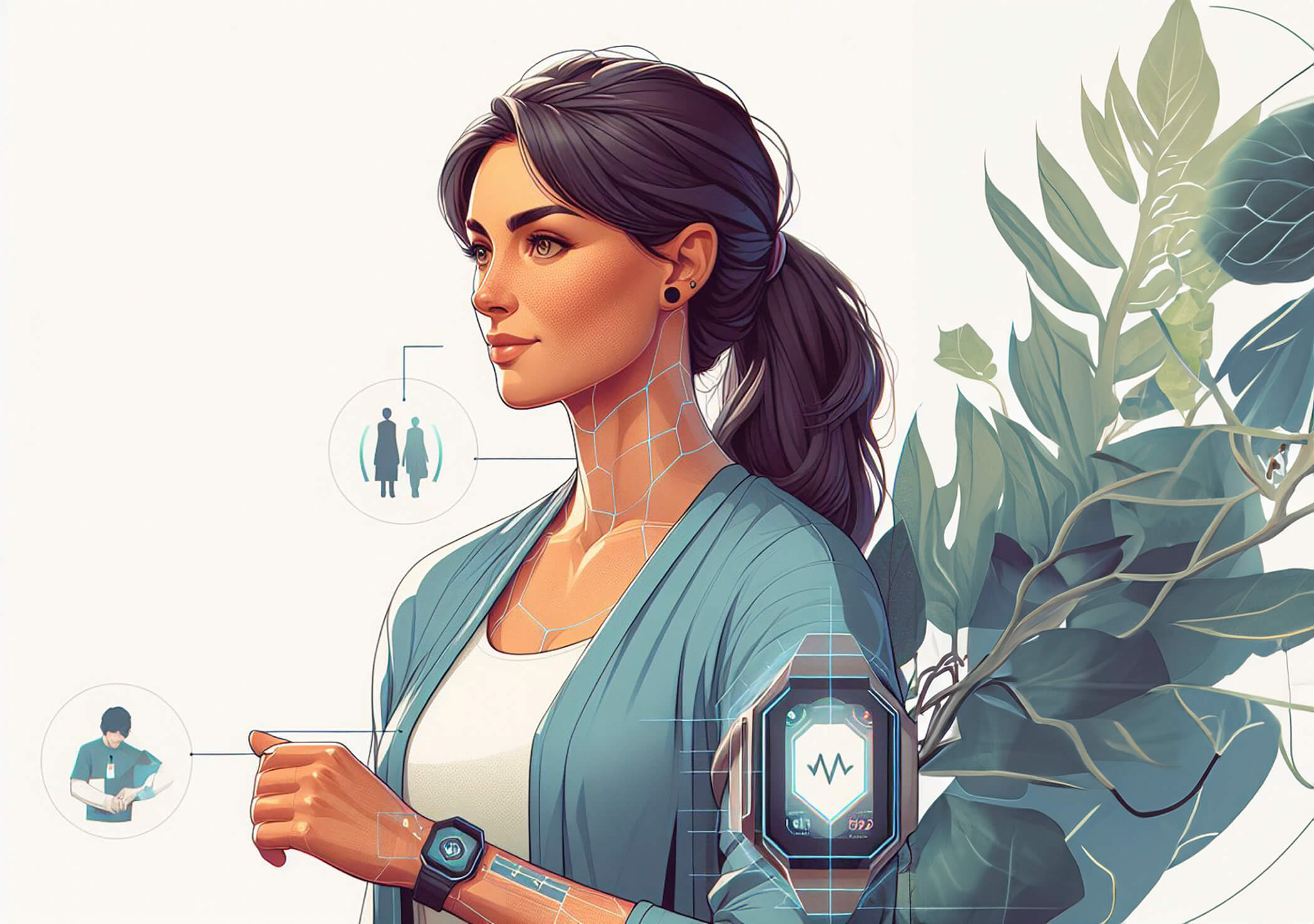
Supported by a sophisticated Health companion App, powered by Gen AI, which integrates data from her wearables, daily schedule, work habits, and dietary choices, Ms. Anna Wilson receives personalised guidance aimed at optimising her overall health and wellness regime.
During a routine check-up, an ECG anomaly triggers advanced diagnostics with a remote cardiologist. Ms. Wilson’s health journey takes a technologically advanced turn.
Collaborating with a remote senior cardiologist, the care team employs the digital twin to simulate various intervention strategies. Leveraging insights from the digital twin, Ms. Anna Wilson’s care team implements a personalised treatment plan defined by Gen AI technology that uses past data as a source or, ensuring swift recovery. Tailored home care instructions via the health companion App monitors progress and promotes medication adherence. Seamless communication supports Ms. Wilson’s smooth return to routine, backed by ongoing guidance and surveillance.
Augmentation by Gen AI
While Gen AI continues to shape hyper-personalised services, its integration into healthcare harnesses its potential to individualise treatment strategies, particularly when conventional approaches fall short.
Thus, Precision medicine embodies a distinctive healthcare approach, considering individual variations in genetics, lifestyle, and environment to deliver precise, personalised interventions.
AI-driven advancements in diagnosis and prognosis facilitate predicting patient characteristics and unique treatment requirements. Integrated healthcare systems leverage vast datasets, empowering sophisticated machine learning algorithms to generate insights and aid clinical decision-making.
By harnessing advanced machine learning techniques and fine-tuning cohorts’ data with Gen AI it enhances the accuracy and efficiency of oncology-related diagnostic imaging, from breast cancer detection to glioma classification. In this fine-tuning-based approach, while working with Gen AI, we use multiple clinically approved LLMs (CLaM) and increase the chance of arriving at the best diagnostics decision. CLAMs and Medical BERT (Med-BERT) models are usually built with large training cohorts and increases the accuracy about 20%. This is significant as it transcends the limitations of individual physicians’ expertise, ensuring standardised and precise outcomes. With Gen AI in fact there’s an opportunity to unveil previously undiscovered insights from neuroimaging data, revolutionising treatment planning and prognostication for CNS malignancies like gliomas.
Tata Elxsi use case
At Tata Elxsi we are working with multi-agent Gen AI-powered solutions which uses Med-BERT and other LLMs as foundation models to derive first level of inferences. This helps in analysing and deriving inferences from images and scanned signals in the domain of cardiology, oncology and ophthalmology.
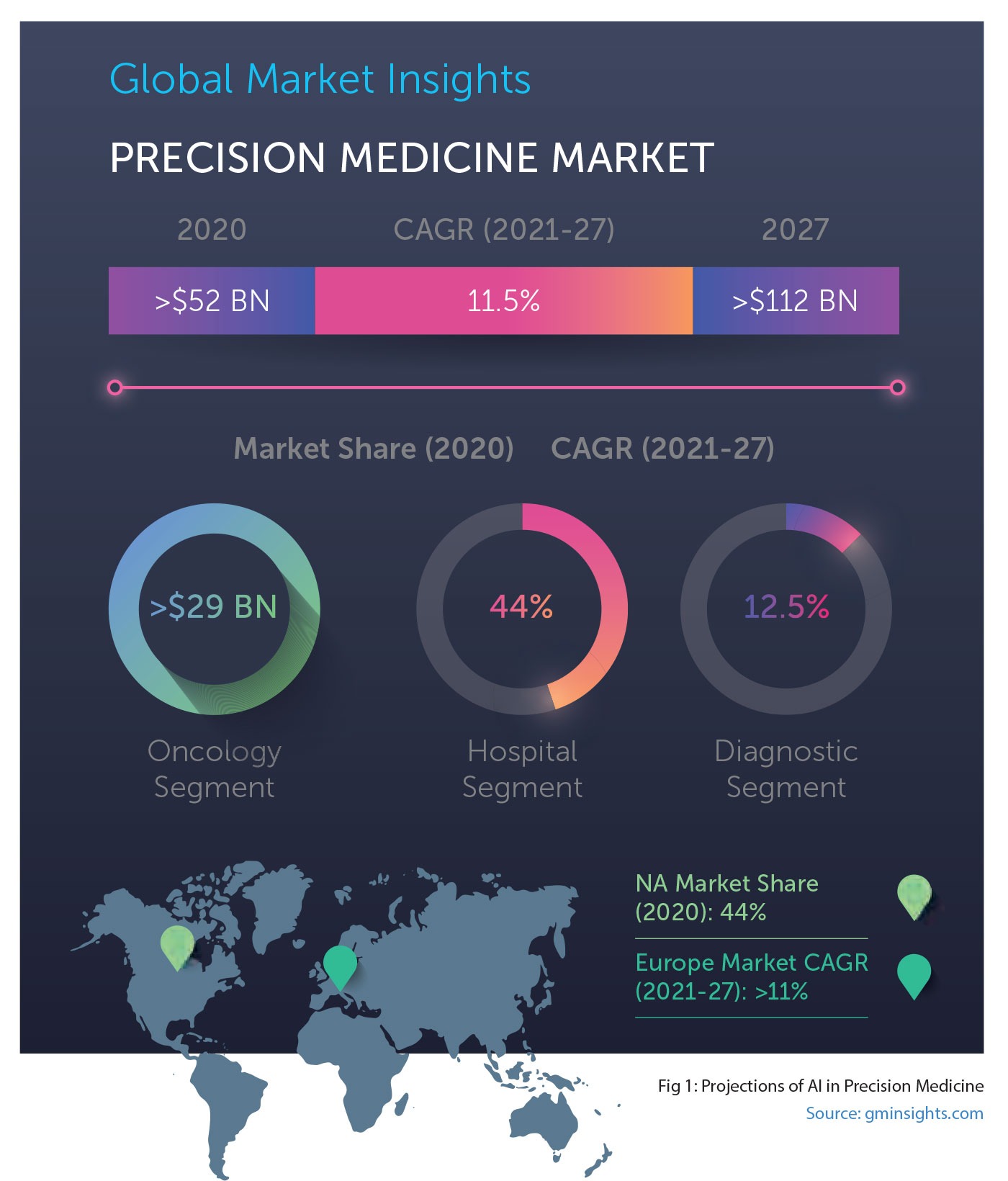
Enablers contributing to the rise of precision medicine
- Advancements in Genetic Study and Genomic Research
- Companion Diagnostics (CDx)
- Regulatory approvals
- Empowering Patients and Engagement
- Technology advancements
- Use of Large-Scale AI
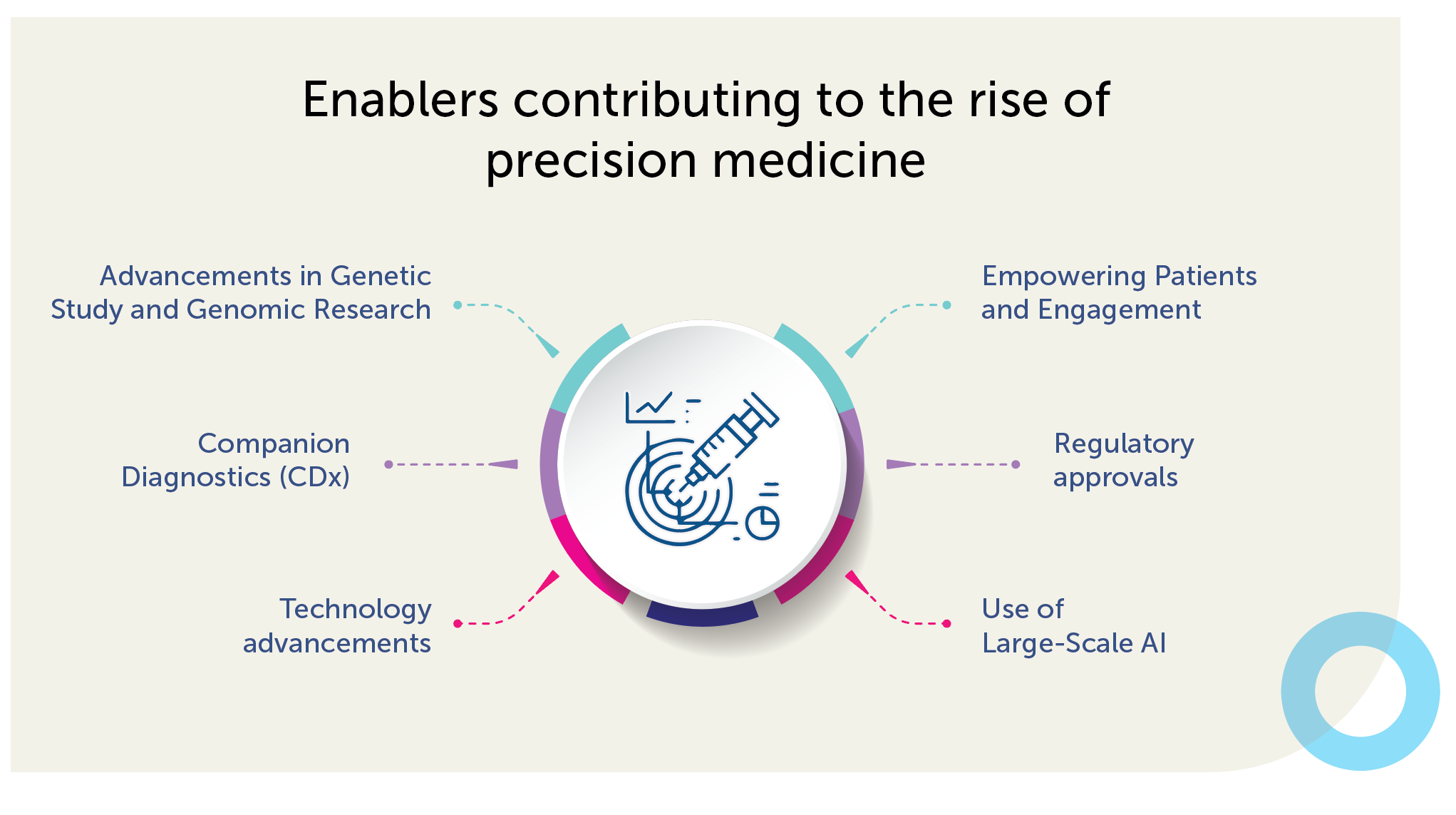
Applications of Gen AI in Precision and Personalised Medicine
Personalised Care Plan: Gen AI makes it possible to integrate huge volumes of data from various sources such as genomic data, EHRs, clinical data etc. to create digital twins of the individual and craft personalised care plans for them.
Identifying genetic variations that can influence individual’s response to medications have also been possible due to advances in genomics (genetic testing and sequencing).
Pharma companies are also tapping on these to develop targeted drugs minimising side effects and improving the rate of success.
Immunotherapy is one emerging area in precision medicine that harnesses the immune system to eliminate diseased cells. Additionally, proactive interventions can be planned by analysing longitudinal data to forecast disease progressions.
For example – An oncologist armed with Gen AI powered tools, through detailed analysis of genetic mark-up, can identify tumour characteristics and immune system profile and suggest most promising immunotherapy options tailored to a patient’s unique molecular profile.
Virtual Assistant for Doctors / Patients: Gen AI serves as a virtual aide for healthcare professionals, extracting and summarising patient data for informed decision-making. Streamlining administrative tasks enhances doctors’ focus on patient care, optimising diagnosis, and treatment accuracy.
Extending to patients, personalised assistance empowers individuals in their healthcare journey, fostering education, monitoring, and treatment adjustment.
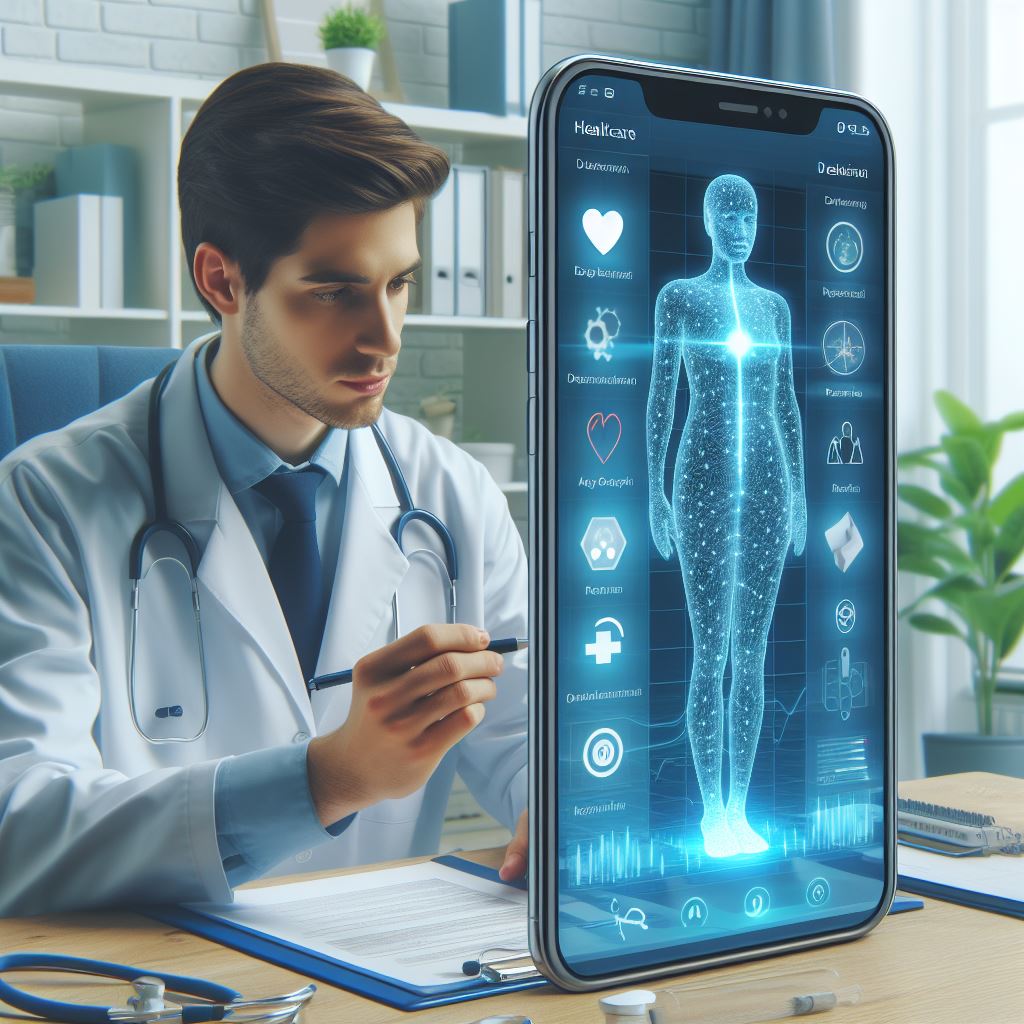
For example – When a doctor sees a new patient in OPD, Gen AI can help to automatically extract and summarise the patient’s medical history, lab results, and personalise treatment plans from the electronic health records (EHR) system. This will help doctors to improve efficiency in patient care delivery and enhanced accuracy in diagnosis and treatment planning. Gen AI can also assist a doctor to automate his/her workflow and other administrative tasks like appointment scheduling, medication orders, and documentation resulting in better collaboration, empowerment, and optimal care delivery.
Synthetic Data: Getting the right data in a compliant manner is one of the biggest challenges in a key AI life cycle. Crucial timelines to get the right data with appropriate consent, encrypting the same and adhering to various privacy / security regulations can be a nightmare for the Data scientists.
Gen AI techniques such as Generative Adversarial networks (GANs), Variational Autoencoders (VAEs) can not only augment existing datasets, making them larger and more diverse, but they can also create data pertaining to rare disease conditions and/or specific population races/ethnicities to have sufficient representation in the data sets.
For example – A research team who wants to diagnose rare cardiovascular conditions using MRI images can use Gen AI and generate synthetic MRI images that closely resemble real patient scans, while ensuring privacy and compliance. The synthetic images capture the diversity of cardiovascular conditions, including rare diseases and variations across different population demographics. This further helps in training a more robust and accurate AI model for diagnosing cardiovascular diseases, ultimately improving patient care and outcomes.
Drug Discovery and Development: Drug discovery is a complex process wherein large amounts of information from literature, research, clinical trials, and other data sources need to be analysed. Gen AI can assimilate the information to support researchers identify candidate drugs, understand their mechanism, predict potential interactions, and determine the efficacy, thus accelerating the drug discovery process.

This can be expanded to select medications likely to be effective for specific patients by predicting individual responses to certain drugs, identifying new applications for existing drugs, analysing data for alternative uses thereby reducing time and costs. Generative models analyse existing drug data to propose alternative therapeutic uses.
For example – Drug discovery investigation being done by a pharma R & D team where traditional drug discovery methods can be time consuming. By using Gen AI, the vast datasets of literature, research and data can help in identifying potential candidate drugs, predict their mechanisms of action, and assess their efficacy. Gen AI will also help in accelerating the drug discovery process, reducing time and costs associated with traditional methods.
It can facilitate the discovery and development of monoclonal antibodies tailored to individual patient profiles. By integrating genomic and proteomic data, AI algorithms can identify antigen targets and predict antibody binding properties, accelerating the design of novel therapeutics.
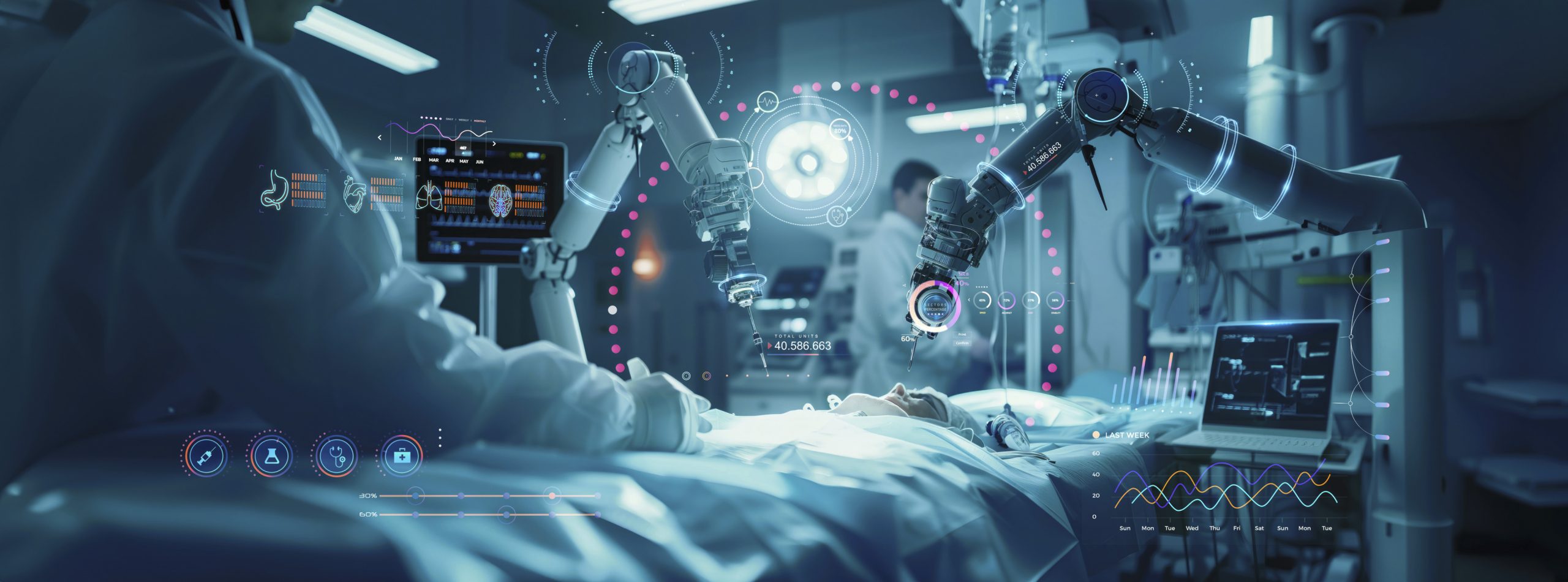
Point of View
As precision medicine continues to evolve, it is imperative to address the challenges and ensure its safe and ethically implemented. The integration of AI and data-driven technologies, such as Gen AI, offers unprecedented opportunities for advancing precision medicine. However, concerns regarding data security, privacy, bias, and ethical implications must be carefully addressed.
While these risks are not new, as they were present in conventional AI as well, however they just get amplified with Gen AI. Additionally, the risk of hallucination, or the generation of inaccurate information can pose a challenge in healthcare, an industry inherently involved with people’s lives. Even more so in precision medicine and personalised treatment, where the stakes of accurate and reliable data interpretation are exceptionally high.
Collaborative efforts among health tech companies, pharmaceutical firms, healthcare providers, regulators, government agencies, and patients are essential to realise the full potential of precision medicine.
Generative AI is the most significant and powerful pervasive computing concept after internet. Just as the internet revolutionised the way we communicate, service delivery and consume services, similarly Gen AI is poised to reshape our approach to computing, fostering the creation of new solutions and services.
At the core of Gen AI’s computing infrastructure lie medical foundation models, which are comprehensive compilations of the medical fraternity’s collective knowledge accumulated over decades (if not centuries). These models integrate diagnostics history, pathology and interplay of complex interactions. This vast knowledge graph is a great source of information, which can be used to derive some of the most innovative and unique solutions to be offered to humanity and yet to be harnessed to its fullest potential.
The advent of Gen AI presents an unparalleled opportunity for software developers and service delivery organisations to tap into this unleashed power, heralding into a new era of technological advancement and application.
Authors
Ajit Ashok Shenvi
Data and AI Excellence Lead, Philips Innovation Campus
Ajit Ashok Shenvi comes with a rich experience of over 25 years at Philips across various leadership roles in digital research, market solutions, and analytics. His tenure reflects a strong focus on data-driven innovation and regulatory excellence, positioning him at the forefront of Philips’ advancements in healthcare technology and AI applications.
Biswajit Biswas
Chief Data Scientist, Tata Elxsi
Biswajit Biswas stands at the forefront of AI-driven transformation. With over a decade experience in leveraging AI to solve complex business challenges, Biswajit has a keen focus on responsible and ethical AI practices, and has developed cutting-edge AI solutions in Healthcare, Automotive and Media.


